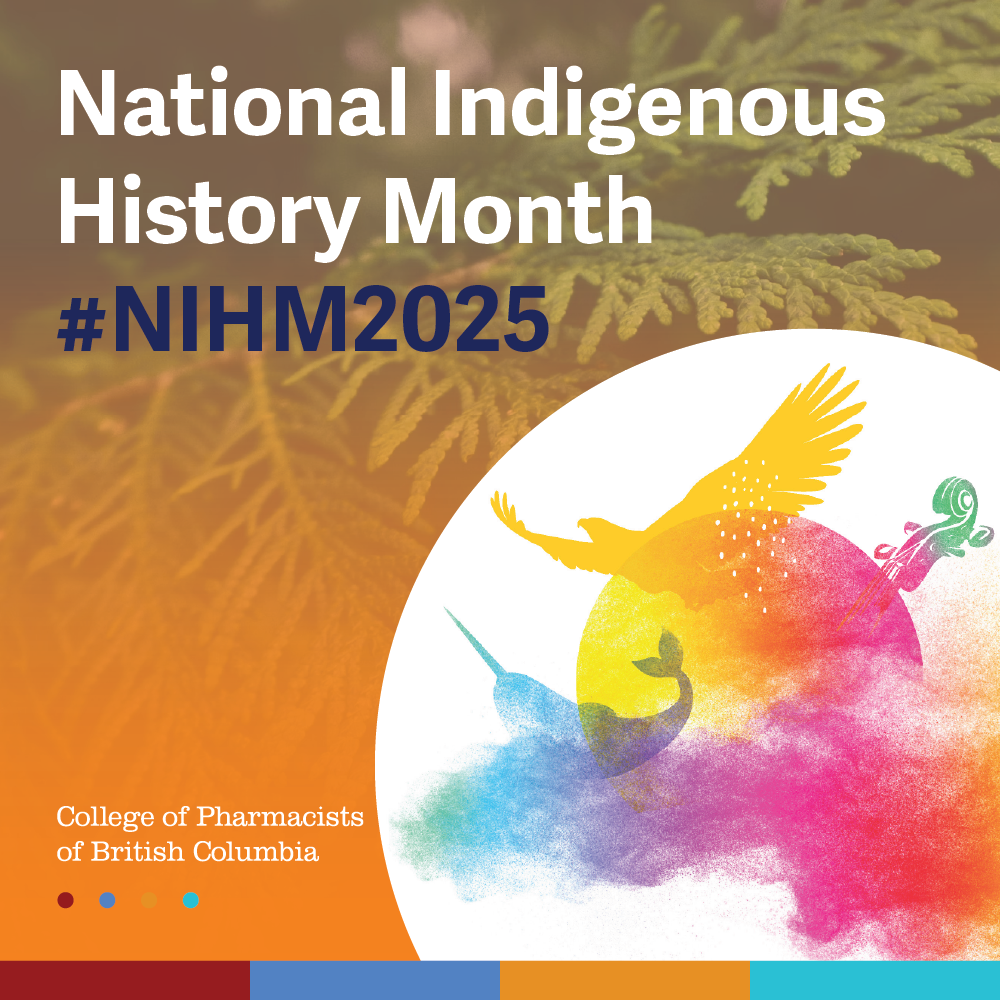Message from the Registrar and CEO: National Indigenous History Month
Every June, during National Indigenous History Month in Canada, we honour the stories, achievements and resilience of First Nations, Inuit, and Métis Peoples across Canada, both now and throughout history. It's a time for us to reflect on and appreciate Indigenous Peoples for their continued stewardship of their lands and waters—on which we are beyond privileged to carry out our lives.
Really, it's a time for all of us to learn. And this year represents a major turning point in our work to build understanding among our registrants of the issues affecting Indigenous Peoples within our health system.
Advancing Indigenous Cultural Safety, Cultural Humility and Anti-Racism Education
In April, we introduced requirements for all 9,000+ pharmacy professionals in BC to complete three hours of mandatory Indigenous Cultural Safety, Cultural Humility and Anti-Racism (ICSH/AR) education as part of their annual continuing education requirements.
This requirement is a natural extension of our commitment to addressing Indigenous-specific racism in pharmacy care, in alignment with both the In Plain Sight Report recommendations and CPBC's Indigenous Cultural Safety, Cultural Humility, and Anti-Racism Practice Standard.
Here's what this is really about - it's about fundamentally changing how we consider the individual circumstances of people receiving pharmacy care in BC. It's about understanding traditional approaches to health and wellness, recognizing how colonialism continues to impact healthcare experiences, and ensuring that pharmacy professionals have the skills to provide culturally safer care.
It’s been inspiring to hear from pharmacy professionals about their learning journeys and to witness their genuine commitment to providing better care for Indigenous clients. Throughout the province, pharmacy professionals are taking creative approaches to their ICSH/AR continuing education, from participating in community-led workshops to engaging with Indigenous health organizations, accessing excellent courses offered by UBC and the Provincial Health Services Authority, and seeking out diverse learning opportunities that deepen their understanding.
Walking Our Own Journey: Our Internal Commitment
We're also walking this path ourselves. Every CPBC staff member and Board member is now also required to complete their own annual ICSH/AR education. As the people setting standards and making decisions that shape pharmacy care, we recognize that we have the same responsibility to examine our assumptions and ensure our regulatory processes don't perpetuate harm. The decisions we make help shape the quality of interactions between pharmacy professionals and Indigenous clients.
I’ve loved hearing about the meaningful ways our staff are deepening their understanding and engagement with Indigenous perspectives. They’re collecting and reading books by Indigenous authors–particularly those that explore colonialism and traditional Indigenous perspectives on health and wellness–and sharing them with their co-workers, creating space for deeper reflection on the worldviews that shape the way we see our work. Staff also continue to write and deliver deeply personal and reflective territorial acknowledgements at meetings, taking time to genuinely consider and connect with First Nations territories. It's practices like these that help us move beyond surface-level awareness to genuine understanding and relationship-building with Indigenous communities.
Welcoming Indigenous Leadership: MaryAnn Enevoldsen
Finally, I'd also like to take this opportunity to welcome MaryAnn Enevoldsen, who joined us in April as our first Director of Indigenous Pathways. MaryAnn is a Coast Salish knowledge keeper from the Homalco First Nation who brings decades of leadership experience to this role. She served as the first female Chief of her Nation and as a BC Treaty Commissioner, where she worked on complex negotiations between First Nations and government.
In just two months, MaryAnn has already begun bringing Indigenous thought leadership into every aspect of our work. She's co-leading our efforts to transform our workplace culture and regulatory processes, ensuring that Indigenous cultural safety and humility are embedded in everything from our daily operations to our strategic initiatives. Her vision and guidance are helping us move beyond good intentions toward meaningful, systemic change that will benefit Indigenous clients throughout BC.
This month, I encourage you to reflect on your own practice and consider how each interaction you have can either continue harmful patterns or create new possibilities for respectful, culturally safe care.
Sincerely,
Suzanne Solven, Registrar & CEO
